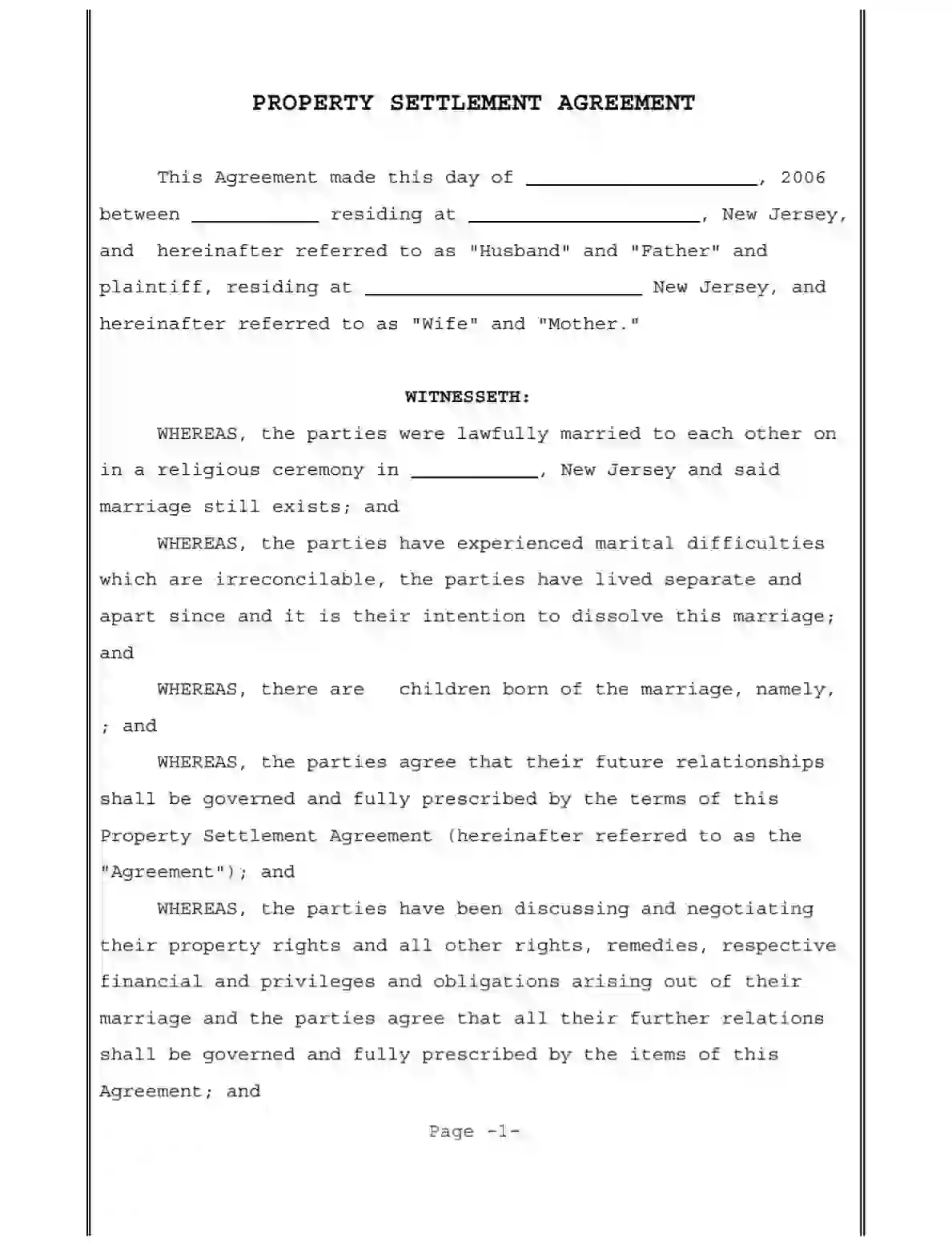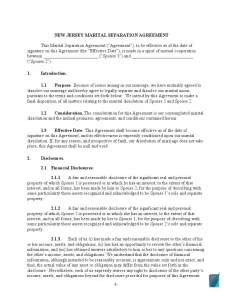New Jersey Marital Settlement (Divorce) Agreement and Legal Separation
Divorce is the process of annulling a marital relationship. People choose to no longer stay together for various reasons, but not any reason is legal. For instance, you cannot end a marriage because you are no longer in love with your life partner or no longer like how they get their haircut anymore. Therefore, just like the rest of the world, in the United States, there is a set of special matrimonial statutes that define marital bond termination causes. However, these regulations don’t make the divorce process any easier. The procedure still can be long and daunting for both parties. Here is our comprehensive guide about the free Marital Settlement Agreement Form.

Build Your Document
Answer a few simple questions to make your document in minutes
Save and Print
Save progress and finish on any device, download and print anytime
Sign and Use
Your valid, lawyer-approved document is ready
Whether a divorce is going to be quick and easy or not may depend on:
- How long the two have been married
- The spouses shared marital property
- Whether the non-filing spouse is ready to accept the terms of the matrimony dissolution or not.
Another nuance that makes the marital separation more difficult is deciding who gets to keep the child. Although both ex-partners remain the child’s legal guardians, only one of them will be the child’s official custodian.
There are cases when a child cooperates with the court for their wishes to be considered. But there are certain peculiarities to the process that make each divorce procedure with children an altogether separate case requiring an individual approach.
And that leads to the idea that each divorce is a unique story, especially in the US, where states have different matrimony dissolution procedures. Thus, it is crucial to know the peculiarities of family laws in your residential state.
New Jersey Divorce and Separation Laws
Below, you will learn about the New Jersey legal conditions and steps for the divorce procedure.
Grounds for Divorce
To get a marriage terminated, New Jersey citizens can choose among the causes listed below:
- A spouse cheated on a life partner.
- One of the spouses has voluntarily abandoned the life partner and has been away for 12 months or longer.
- Spouses have not been sharing the same residency for 18 (and more) months in a row, resulting in their alienation and loss of desire for possible restoration of healthy marital relations.
- Severe cruelty (physical or metal). Suppose hostile actions from one spouse towards the other make it impossible to live under the same roof because the latter no longer feels safe. It serves as a legal cause for marital bond termination. However, the offended party can only do that after three months from the last day of cruelty.
- Drug or alcohol addiction of one of the spouses.
- Mental illness of a spouse that had them put in a mental facility for two years or more.
- The imprisonment of a partner for more than a year and a half, leading to the inability to live together after the release.
- The sort of sexual demeanor that is deemed inappropriate by one of the parties.
However, not all marriages end up as a result of one of the causes mentioned above. Sometimes people choose to part because they no longer see any reason to be together—no-fault marriage termination.
Restrictions
In New Jersey, you can only request a divorce if you have been a state resident for one full year. But there’s an exception—if the marriage is subject to termination due to adultery, it is enough if one of the spouses has been a state resident for any period less than a year.
Property Division
Marital property is anything a couple purchased or acquired during the marriage. Such property can also be the result of non-monetary mutual investment by the parties. Anything that belonged to each party before their marriage stays unconsidered by the court and. Therefore, it is not subject to division.
In New Jersey, when dividing marital property, courts use the policy of equal distribution. This means that ex-partners can count for a fair and equal assets division. Of course, such an approach takes a fair amount of factors and nuances into consideration.
For instance, the court will review the length of married life, amount of money invested by each party, the actual material needs, and the amount of work each party has put into common property. What is also important is whether any of the spouses had been previously married. The judge might also consider any existing health issues, means of earning a living, and personal earnings. Age, occupation, professional skills, debts, and future financial prospects matter in a divorce process.
Child Custody and Visitation
Child custody is regulated by the New Jersey Divorce Statutes 9:2-4. According to the law, the court decides who will take care of a child as an official custodian.
As with the division of marital assets, child custody is determined after considering various factors: the child’s opinion, the parties preferences, the child’s needs, the parties’ ability to cooperate to give proper upbringing to their offspring, the child’s relationship with either of the parents, the parties’ job situations, the geographical location and how it can affect the child’s everyday life, and others.
As for child visitation rules, the New Jersey family courts make decisions to suit the child’s best interests. Both parents are advised to share custodial duties unless there are no other restrictions against either party. However, if one of the parents does not get the custodial right, they get the opportunity to visit their child.
The child visitation rules are quite confusing regarding the third party: grandparents, aunts, uncles, and other relatives. Unfortunately, despite the specific legal regulations on the issue, they are subject to discussions and broad interpretation.
Popular Local Marital Settlement Agreement Forms
Even though it is not required to create a marital settlement agreement, this document may offer you several benefits: far more confidence after the divorce and a lot less pain during the hearing. Here’s a number of such local agreements Googled the most by our readers.
Child Support and Alimony
Child support is the responsibility of a non-custodial partner to take part in their child’s life financially. In New Jersey, courts rule on child support after considering several factors, including (but not limited to) the child’s needs, financial possibilities of both parents, the parents’ and the child’s age, health condition, etc.
The New Jersey family court chooses shared child support as part of a shared child’s custody settlement.
Spousal support is the court’s resolution to oblige one of the ex-spouses to support the other financially. This practice exists to ease the divorce burden and make it equally bearable for both sides of the process. Unfortunately, sometimes divorce may substantially affect one of the ex-partners’ lifestyle, resulting in a worsening financial situation. Deciding whether or not to choose spousal support and how long it should last takes an individual approach in each case.
Legal Separation
Sometimes a married couple chooses to take some time on their own and try to live independently from one another. But at the same time, the two don’t want to rush and get divorced for various reasons. In this case, the couple can opt for a legal separation.
It is a legal practice common in matrimonial laws in the US, and New Jersey is no exception. To get legally separated, the two will have to sign a particular form. Although the separated spouses live apart, they remain married. This situation is often regarded as time-off in a marital relationship. During a legal separation, the two may choose to get back together or decide to go on with the divorce procedure.

Filing for Divorce in New Jersey
Below are detailed instructions for filing for divorce by existing legal procedures.
1. Fill Out a Petition
Even though a divorce may be a two-party decision, only one of the parties can start the procedure. It takes filling out a particular document and sending it to the local court. The divorce petition must include all the necessary marriage details, children-related information, and a cause for divorce.
If you have any difficulties filling out a divorce complaint, we invite you to use our form-building application.
2. File the Petition to the Court
After creating the petition according to the state’s family statutes, the filing spouse can send it to the court—the petition is then delivered to the second party.
3. Wait for the Response
When the second party receives the divorce petition, they will have to give their response. The reply may come in either an Appearance, an Answer, or a Counterclaim.
If the second party replies with an Appearance, it would effectively mean accepting the divorce request and participating in the procedure. If the response comes as an Answer, it would mean the second party has chosen not to comply with the divorce request terms. And finally, if the non-filing party responds with a Counterclaim, it would mean they will ask the court to consider their own grounds for divorce.
4. File a Case Information Statement
A Case Information Statement (CIS) is required from both parties. The court will use the information as a reference when issuing resolutions on the divorce’s financial sides, such as spousal support and marital assets dispute.
5. Follow the Pre-Hearing Procedures
In New Jersey, when you file for divorce, it does not mean that there has to be an actual trial. A trial is the last resort, and it is held only if the parties can’t come to an agreement before the hearing.
Those pre-trial procedures include:
- Early settlement panel
- Economic mediation
- Intensive settlement conference
If none of the above helps the parties find common ground for a pre-trial divorce, they will be granted divorce during the hearing.
6. Proceed to Hearing
A trial is the final step of the divorce procedure in New Jersey. Upon its conclusion, the divorcees receive the Final Judgement of Divorce, which means the two are no longer married.

Interested in other New Jersey documents? We offer free forms and straightforward personalization experience to anybody who wants having fewer to none challenges when handling documents.
Other Marital Settlement Agreement Forms by State